With the sun shining once
again, we were up and out early, keen to start our day at the famous S’Albufera
Natural Park, an extensive set of reedbeds and wetlands situated just south of
Port d’Alcudia. With our hotel backing on to the reserve, we only had to step
through the gate for the birding to begin.
The Audouin’s Gulls from the
previous evening were once more in residence on the sandy island, their blood
red bills distinctive and shining out, while a pair of Sandwich Terns joined
them resting on the wooden posts. Several ducks also congregated in the muddy
shallows of the pool with Mallards, Teal and Wigeon all in attendance while
Greenshanks and Spotted Redshanks probed knee deep in the still water. The
electric blue flash of a Kingfisher zipping under the bridge was also a welcome
surprise as we scanned the reedy fringes for any Moustached Warblers.
With time pressing on we drove
the short distance to the reserve car park before walking the 1km entrance road
to the Visitor Centre. Evidently packed with birdlife and decidedly rich in
avian delights, a pair of Firecrests actively feeding in the conifers lining
the track were our first birds of note, while the explosive bursts of Cetti’s
Warblers in the surrounding reeds betrayed the presence of these secretive
birds.
 |
| Firecrest |
Our main target here was the
equally elusive Moustached Warbler, with S’Albufera Nature Park offering some
of the best chances anywhere in Europe to see this skulking species. Our ears
alert and eyes peeled, it wasn’t long before we’d caught a snatch of Reed
Warbler-like song emanating from the extensive reedbeds to the left hand side
of the path.
Far too early to be anything else and listening intently as the
sound came closer and closer, this resident reed dwelling specialist eventually
made its appearance, offering glimpses of plumage as it hopped mouse-like
through the vegetation. After providing tantalising views for several minutes
our perseverance finally paid off, with our songster perching out in the open
on an exposed reed stem and providing great views of the distinctive broad
white supercilium and narrow black moustachial stripe that gives it its name.
 |
| Moustached Warbler! |
Unsure as to whether we’d be able to locate any on our trip, it was fantastic
to get such good views of this skulking warbler, and despite hearing several
during the day, only two individuals ever came out in to the open.
Carrying on up the track
adjacent to the long canals, we soon came across another good bird for the site
in the form of four Marbled Ducks, preening in the centre of the water and
providing much closer views than our only other individuals seen to date (on
mainland Spain 3 years ago) which were exceptionally distant.
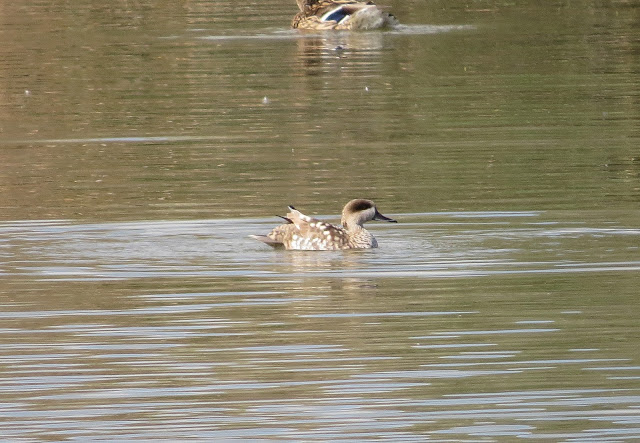 |
| Marbled Duck |
With many species
at S’Albuera Natural Park deriving from reintroduced stock (including the
Purple Swamphens and Red-knobbed Coots) the Marbled Ducks here at least appear
to be the real deal.
A large flock of roosting
Black-crowned Night Herons sitting peacefully hidden amongst the branches of
the overhanging trees lining the canal resulted in an impressive count of 22
birds, while both Little and Great White Egrets in the company of Grey Herons
probed amongst the reedy canal fringes.
 |
| Black-crowned Night Heron |
Arriving at the Visitor Centre
and picking up our free day pass to the reserve, we were told that the favoured
areas for Red-knobbed Coots were the canals and bridges directly outside the
building.
Sure enough upon approaching the first viewpoint Alex spotted a
distinctive looking coot feeding around the opposite bank, two unmistakable red
appendages shining out on the top of its head.
 |
| Red-knobbed Coot! |
Pleased we had located one so quickly,
we weren’t quite prepared for what happened next, with the coot spotting us and
promptly swimming over to the viewing point, before emerging out of the water
and on to the mud at our feet!
Obviously well accustomed to getting fed by the
hundreds of visitors that come to the reserve each day, the coot was clearly
looking for us to provide a free lunchtime snack, but with nothing to offer it
soon retreated back in to the water, busying itself amongst the reeds and
affording excellent views.
Before long a second
individual approached, this time sporting one of the white PVC neck collars
from the reintroduction scheme that took place on the reserve over ten years
ago. In total we saw two of these individuals (codes 1NA and 1N7) with
information coming back from the project that one of these birds was rung back
in December 2010, with only 4 reported sightings of it since.
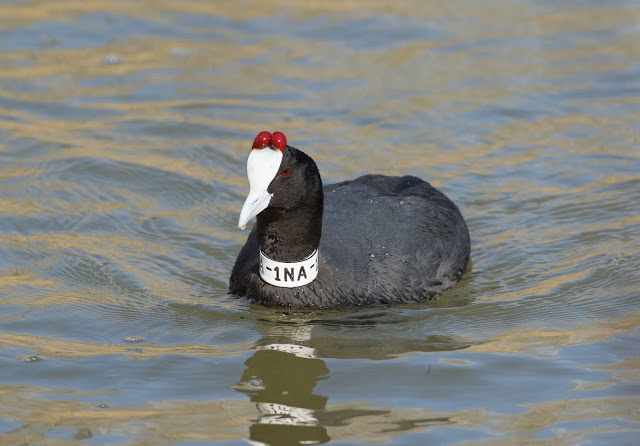 |
| Red-knobbed Coot 1NA |
With the reintroduction of
Red-knobbed Coots to S’Albuerfa Natural Park starting in 2004 when individuals
of wild stock were translocated from Doñana National Park on mainland Spain,
the birds have thrived here in the years since, breeding amongst themselves to
sustain the population.
Doing some research into the project and whether the
population has now passed the ‘3 generations of breeding’ threshold to be
officially classed as self-sustaining has drawn a blank however, although we
did see evidence of population expansion for ourselves with two of the birds
observed mating. Recent photographs also depict youngsters belonging to non-neck
collared birds, which would indicate that the population is up to 2nd
generation breeding at least. With coots reaching maturity relatively quickly,
it is highly probable that in the 13 years since the project began, the
population must surely have passed the 3rd generation breeding stage.
Regardless of their official
status though, these were incredible birds to see and the experience of seeing
them up close was most definitely a highlight of the trip!
 |
| Friendly Coot! |
As well as birds, the reserve
was also rich in flora, and we discovered several large stands of what I later
identified as Giant Orchids (Himantoglossum robertianum) lining the pathways.
 |
| Giant Orchid |
Reminiscent slightly of our Military
Orchids back in the UK, I set to work getting some record shots (having not
taken a macro lens with me) and we counted a good handful of these impressive
plants across the site.
Having enjoyed our fix of the
Red-knobbed Coots we set to work exploring the rest of the pools scattered
across the reserve. An impressive count of 51 Kentish Plovers roosting on one
of the spits was a notable addition along with a pair of Little Ringed Plovers,
while good numbers of feeding Black-winged Stilts navigated the shallower
areas. Several Marsh Harriers patrolled the extensive reedbeds looking for prey,
while a single pale morph Booted Eagle also floated overhead.
A movement in the distant
reeds revealed the bright purple and red tones of our first of four Purple
Swamphens for the site, while a fine Little Bittern posed uncharacteristically
out in the open below one of the small bridges, before slowly retreating back
in to cover due to the approach of an overly curious Moorhen.
With the afternoon to spare
and with our targets of Moustached Warbler and Red-knobbed Coot in the bag, we
decided to take a look at the beach opposite the reserve to see if we could
find anything else of note, Alex picking up a second well camouflaged Little
Bittern as we headed back down the entrance road.
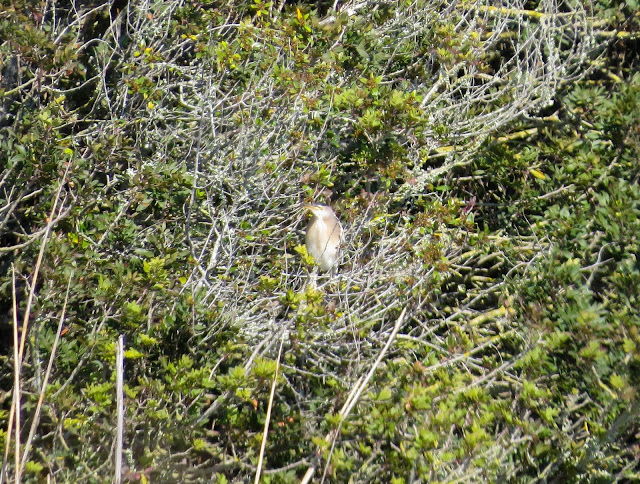 |
| Little Bittern |
Approaching the sparkling
ultramarine waters of the bay, we located several more Giant Orchids nestled
proudly amongst the scrubby beach grass, these gone slightly further over in
terms of flowering than those in the reserve, while a skulking Sardinian Warbler
serenaded us from the depths of a nearby coastal shrub, scarlet eye peering
beadily out from between the thorns.
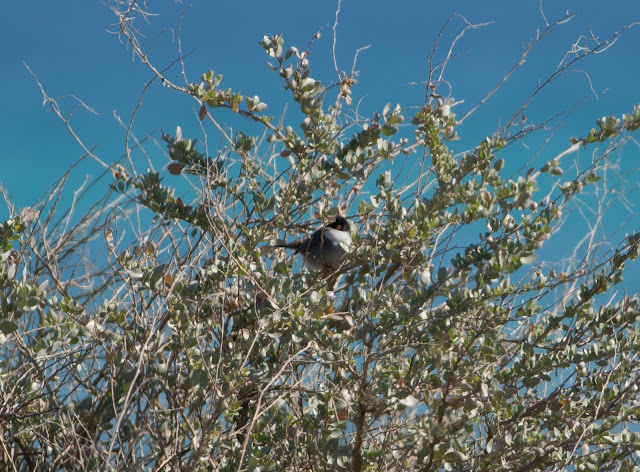 |
| Sardinian Warbler keeping a low profile |
Black Redstarts, like everywhere else on
the island were in attendance here too, while a pair of scavenging
Yellow-legged Gulls loafed around the rocks keeping an eye out for morsels.
 |
| The views at the beach were stunning! |
Scoping out to sea Alex soon
picked up a large travelling flock of 58 Balearic Shearwaters heading south,
their browner tones visible through the scope but with sadly no Yelkouans
amongst them. 9 Razorbills floating on the sea were also an unexpected find
here, and correspondence with the local Mallorca e-bird recorder suggests they
are not all that commonly recorded in the area.
 |
| Little Egret |
With the afternoon pressing on
a final check on the pools opposite our hotel resulted in several more
Black-winged Stilts, this time joined by a handful of Avocets and 8 Pintail
mingled in with the Gadwall, Shovelers and Shelducks.
 |
| Black-winged Stilt gathering |
Two showy Sardinian
Warblers in the hotel gardens were also a bonus, although their active nature
and constant movement like the Balearic Warblers once more made photographing
them almost impossible.
 |
| Sardinian Warbler |
 |
| Our hotel - and the reserve directly outside the window! |
Interestingly what appeared to be a recently fledged
youngster was accompanying them, evidence of much earlier breeding of this
species in the Mediterranean than we were expecting.
 |
| Fledgling Sardinian Warbler! |
Having visited in the off-peak
season for tourists it soon became clear that finding a restaurant for the
evening was turning in to a nigh on impossible task (it was now obvious why the
hotel buffet offering was so popular the evening before). We eventually lucked
in on a steakhouse grill establishment (encountering our only Hoopoe of the
trip on the way) and soon settled down to enjoy a tasty offering of Mallorcan
lamb chops and seafood pizza, sadly denied a much sought after cheese and
Spanish ham toastie however after our waiter refused to serve it without
tomatoes!




















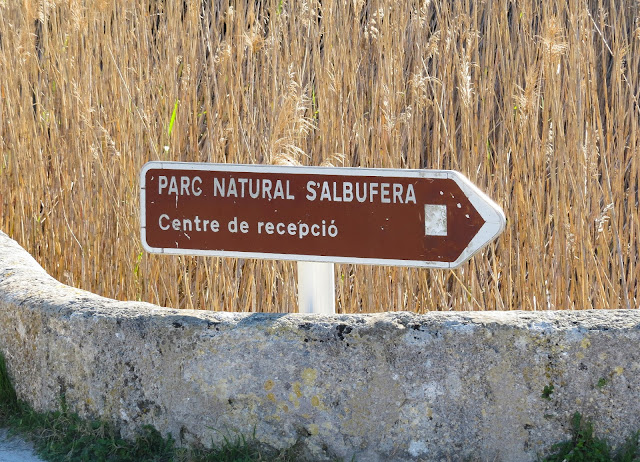
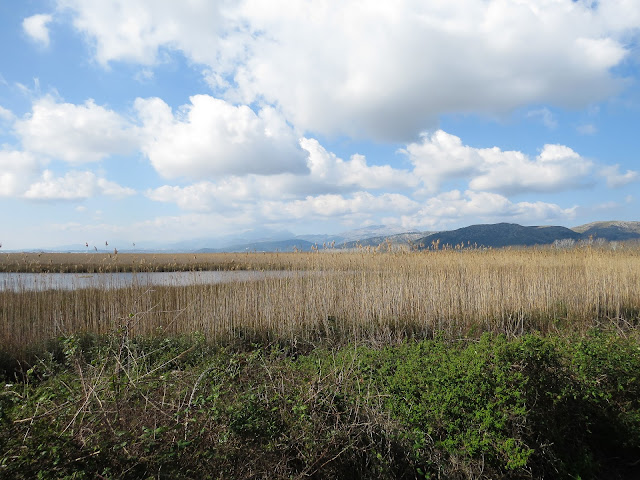

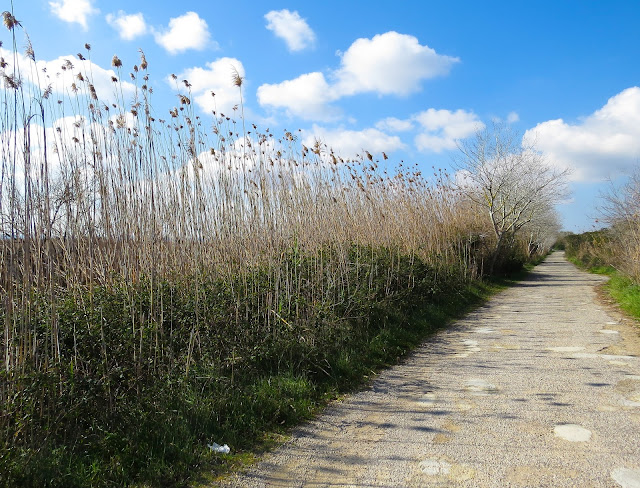










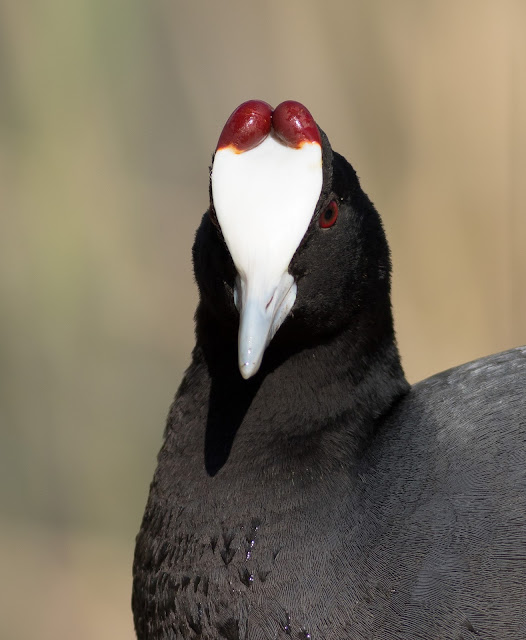
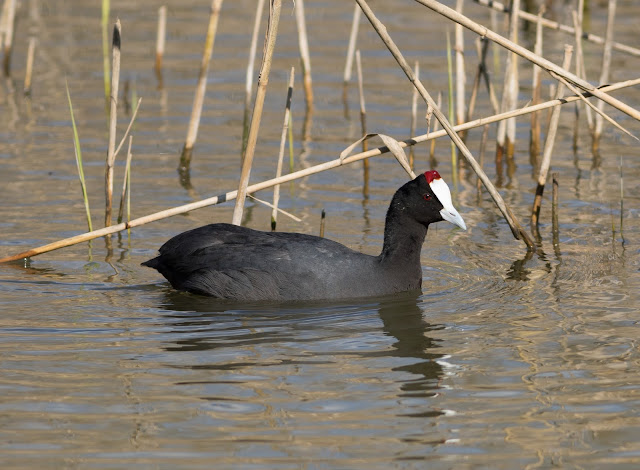


















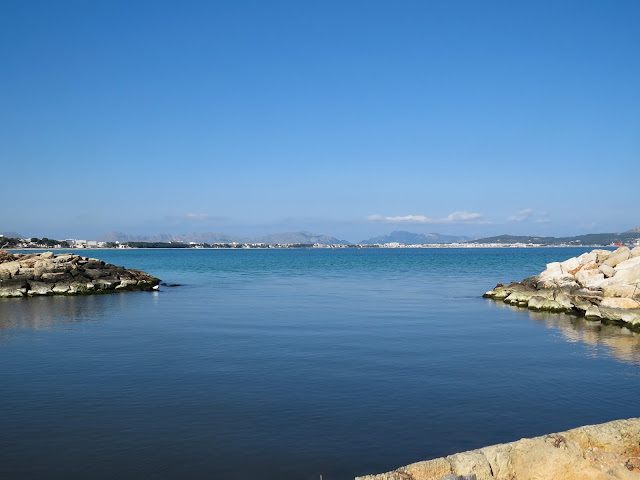


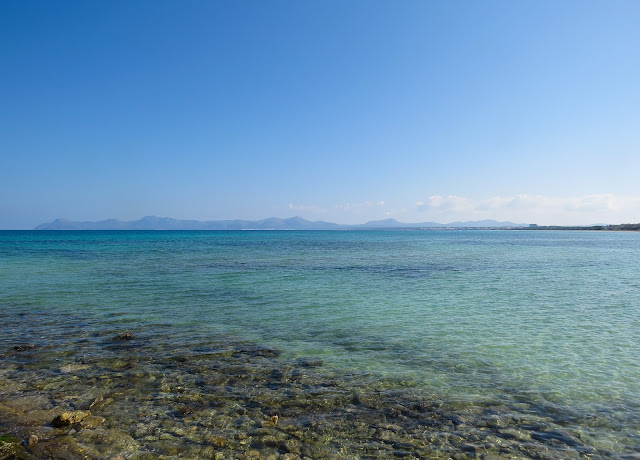




No comments:
Post a Comment